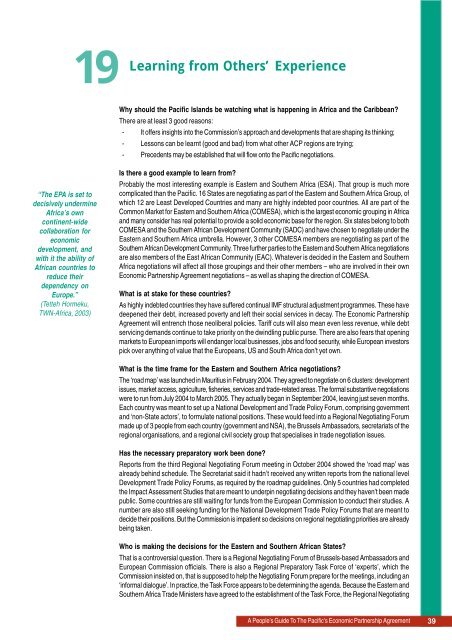REPA Booklet - Stop Epa
REPA Booklet - Stop Epa
REPA Booklet - Stop Epa
You also want an ePaper? Increase the reach of your titles
YUMPU automatically turns print PDFs into web optimized ePapers that Google loves.
19<br />
Learning from Others’ Experience<br />
Why should the Pacific Islands be watching what is happening in Africa and the Caribbean?<br />
There are at least 3 good reasons:<br />
- It offers insights into the Commission’s approach and developments that are shaping its thinking;<br />
- Lessons can be learnt (good and bad) from what other ACP regions are trying;<br />
- Precedents may be established that will flow onto the Pacific negotiations.<br />
“The EPA is set to<br />
decisively undermine<br />
Africa’s own<br />
continent-wide<br />
collaboration for<br />
economic<br />
development, and<br />
with it the ability of<br />
African countries to<br />
reduce their<br />
dependency on<br />
Europe.”<br />
(Tetteh Hormeku,<br />
TWN-Africa, 2003)<br />
Is there a good example to learn from?<br />
Probably the most interesting example is Eastern and Southern Africa (ESA). That group is much more<br />
complicated than the Pacific. 16 States are negotiating as part of the Eastern and Southern Africa Group, of<br />
which 12 are Least Developed Countries and many are highly indebted poor countries. All are part of the<br />
Common Market for Eastern and Southern Africa (COMESA), which is the largest economic grouping in Africa<br />
and many consider has real potential to provide a solid economic base for the region. Six states belong to both<br />
COMESA and the Southern African Development Community (SADC) and have chosen to negotiate under the<br />
Eastern and Southern Africa umbrella. However, 3 other COMESA members are negotiating as part of the<br />
Southern African Development Community. Three further parties to the Eastern and Southern Africa negotiations<br />
are also members of the East African Community (EAC). Whatever is decided in the Eastern and Southern<br />
Africa negotiations will affect all those groupings and their other members – who are involved in their own<br />
Economic Partnership Agreement negotiations – as well as shaping the direction of COMESA.<br />
What is at stake for these countries?<br />
As highly indebted countries they have suffered continual IMF structural adjustment programmes. These have<br />
deepened their debt, increased poverty and left their social services in decay. The Economic Partnership<br />
Agreement will entrench those neoliberal policies. Tariff cuts will also mean even less revenue, while debt<br />
servicing demands continue to take priority on the dwindling public purse. There are also fears that opening<br />
markets to European imports will endanger local businesses, jobs and food security, while European investors<br />
pick over anything of value that the Europeans, US and South Africa don’t yet own.<br />
What is the time frame for the Eastern and Southern Africa negotiations?<br />
The ‘road map’ was launched in Mauritius in February 2004. They agreed to negotiate on 6 clusters: development<br />
issues, market access, agriculture, fisheries, services and trade-related areas. The formal substantive negotiations<br />
were to run from July 2004 to March 2005. They actually began in September 2004, leaving just seven months.<br />
Each country was meant to set up a National Development and Trade Policy Forum, comprising government<br />
and ‘non-State actors’, to formulate national positions. These would feed into a Regional Negotiating Forum<br />
made up of 3 people from each country (government and NSA), the Brussels Ambassadors, secretariats of the<br />
regional organisations, and a regional civil society group that specialises in trade negotiation issues.<br />
Has the necessary preparatory work been done?<br />
Reports from the third Regional Negotiating Forum meeting in October 2004 showed the ‘road map’ was<br />
already behind schedule. The Secretariat said it hadn’t received any written reports from the national level<br />
Development Trade Policy Forums, as required by the roadmap guidelines. Only 5 countries had completed<br />
the Impact Assessment Studies that are meant to underpin negotiating decisions and they haven’t been made<br />
public. Some countries are still waiting for funds from the European Commission to conduct their studies. A<br />
number are also still seeking funding for the National Development Trade Policy Forums that are meant to<br />
decide their positions. But the Commission is impatient so decisions on regional negotiating priorities are already<br />
being taken.<br />
Who is making the decisions for the Eastern and Southern African States?<br />
That is a controversial question. There is a Regional Negotiating Forum of Brussels-based Ambassadors and<br />
European Commission officials. There is also a Regional Preparatory Task Force of ‘experts’, which the<br />
Commission insisted on, that is supposed to help the Negotiating Forum prepare for the meetings, including an<br />
‘informal dialogue’. In practice, the Task Force appears to be determining the agenda. Because the Eastern and<br />
Southern Africa Trade Ministers have agreed to the establishment of the Task Force, the Regional Negotiating<br />
A People’s Guide To The Pacific’s Economic Partnership Agreement 39
















